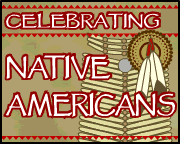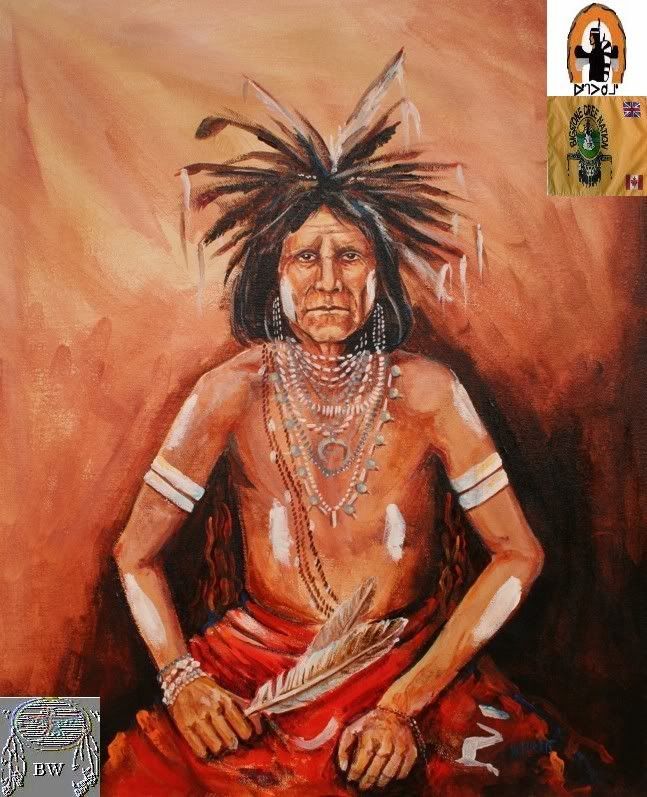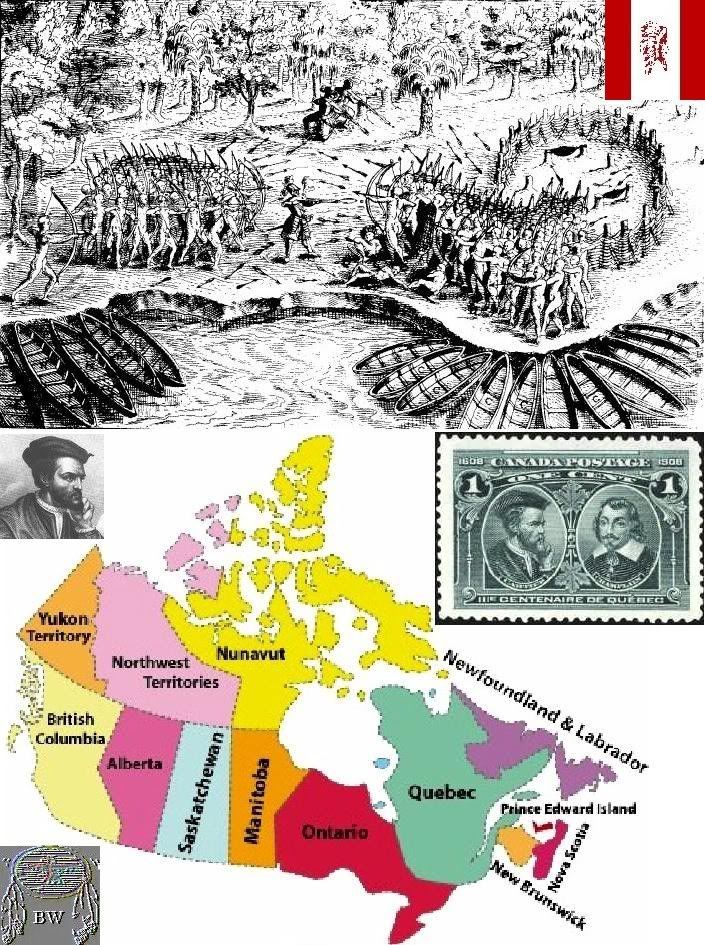|
BRAVEHORSE WARRIOR Pastedechouan
Montagnais Warrior

 Chief Pastedechouan
Warrior Citation
PASTEDECHOUAN (Patetchoanen, Ahinsistan, Atetkouanon), Pierre-Antoine, Montagnais Indian, early victim of French-Indian cultural
conflict; fl. 1620–36. The life of Pastedechouan provides a tragic example of one aspect of the European impact on Native
American culture. In 1620 he was taken as a child to France by the Recollets, baptized, and given the name Pierre-Antoine,
with the Prince de Guémenée acting as his godfather. The latter supervised his studies for the next five years and Pastedechouan
became proficient in both Latin and French. He was persuaded to return to Canada in 1626 with the Recollet Father Joseph de
La Roche Daillon, who arrived in August of that year. Pastedechouan lived for a time with the Recollets at Quebec but did
not mix with the Native Americans, probably because he had almost forgotten his own language. He was, therefore, advised to
return to his own district near Tadoussac and to live with his three brothers, Carigouan (a famous medicine-man who had great
influence over him), Mestigoït, and Sasousmat, so that he might again become fluent in his native tongue.
Chief Pastedechouan
Warrior Citation
PASTEDECHOUAN (Patetchoanen, Ahinsistan, Atetkouanon), Pierre-Antoine, Montagnais Indian, early victim of French-Indian cultural
conflict; fl. 1620–36. The life of Pastedechouan provides a tragic example of one aspect of the European impact on Native
American culture. In 1620 he was taken as a child to France by the Recollets, baptized, and given the name Pierre-Antoine,
with the Prince de Guémenée acting as his godfather. The latter supervised his studies for the next five years and Pastedechouan
became proficient in both Latin and French. He was persuaded to return to Canada in 1626 with the Recollet Father Joseph de
La Roche Daillon, who arrived in August of that year. Pastedechouan lived for a time with the Recollets at Quebec but did
not mix with the Native Americans, probably because he had almost forgotten his own language. He was, therefore, advised to
return to his own district near Tadoussac and to live with his three brothers, Carigouan (a famous medicine-man who had great
influence over him), Mestigoït, and Sasousmat, so that he might again become fluent in his native tongue.
 Here he was found in 1629 by the English, who, under the command of the Kirke brothers, had come to invade Canada. At
first Pastedechouan pretended that he could not understand the English who questioned him in both French and Latin but a French
deserter exposed this feigned ignorance. The English held Pastedechouan as an interpreter, supplied him with goods to trade
with the Indians at Trois-Rivières, and permitted him to start off alone. He did not return. During the English occupation
of Quebec, Pastedechouan turned away from Christianity and reverted to his native customs and way of life. In 1632, after
the French regained New France, Pastedechouan visited Émery de Caën, who employed him as an interpreter but later dismissed
him as unreliable. On 13 Nov. 1632, Pastedechouan, who was now incapable of maintaining himself by hunting, took up residence
with the Jesuit fathers at Quebec, where he was to teach Father Paul Le Jeune the Montagnais language. He refused, however,
to continue with his lessons after Easter 1633 and rejoined his brothers. Le Jeune, anxious to master the language and to
commence his missionary work, joined them in a hunting expedition. Pastedechouan, crazed by drink and completely under the
domination of Carigouan (who hated the priest), proved of no help to Le Jeune during this winter of near starvation in the
forests. He did, however, accompany his brother Mestigoït, who paddled Le Jeune to safety at Quebec through the early spring
break-up of the frozen St. Lawrence. Pastedechouan married a daughter of Manitougatche, who left him, whereupon he took a
wife from another nation. He is said to have had four or five wives in all. Before he died the women ridiculed him. In 1636
he died of starvation, alone in the woods. From: historical accounts & records
Here he was found in 1629 by the English, who, under the command of the Kirke brothers, had come to invade Canada. At
first Pastedechouan pretended that he could not understand the English who questioned him in both French and Latin but a French
deserter exposed this feigned ignorance. The English held Pastedechouan as an interpreter, supplied him with goods to trade
with the Indians at Trois-Rivières, and permitted him to start off alone. He did not return. During the English occupation
of Quebec, Pastedechouan turned away from Christianity and reverted to his native customs and way of life. In 1632, after
the French regained New France, Pastedechouan visited Émery de Caën, who employed him as an interpreter but later dismissed
him as unreliable. On 13 Nov. 1632, Pastedechouan, who was now incapable of maintaining himself by hunting, took up residence
with the Jesuit fathers at Quebec, where he was to teach Father Paul Le Jeune the Montagnais language. He refused, however,
to continue with his lessons after Easter 1633 and rejoined his brothers. Le Jeune, anxious to master the language and to
commence his missionary work, joined them in a hunting expedition. Pastedechouan, crazed by drink and completely under the
domination of Carigouan (who hated the priest), proved of no help to Le Jeune during this winter of near starvation in the
forests. He did, however, accompany his brother Mestigoït, who paddled Le Jeune to safety at Quebec through the early spring
break-up of the frozen St. Lawrence. Pastedechouan married a daughter of Manitougatche, who left him, whereupon he took a
wife from another nation. He is said to have had four or five wives in all. Before he died the women ridiculed him. In 1636
he died of starvation, alone in the woods. From: historical accounts & records
|

